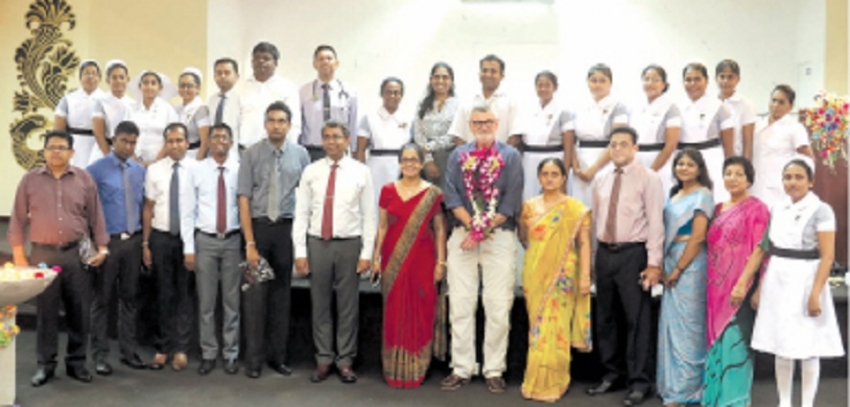According to the Consultant Oncologist attached to the National Cancer Institute, Maharagama (Apeksha Hospital), Dr. Prasad Abeysinghe, the bone marrow transplant project was to be performed at the Apeksha Hospital four years ago. A bone marrow transplant unit cannot be opened only with money or a building complex. The most important requirement is proper training for the team of health professionals.
Dr. Abeysinghe said the best bone marrow transplant programme at international level is now available at the Maharagama Apeksha Hospital. “We have already performed bone marrow transplant surgeries for diseases such as myeloma and lymphoma. A bone marrow transplant can be performed soon for more diseases like leukaemia,” he said. Speaking at the ceremony, Haematology Department Head Dr. Sam Millikan, attached to St. Vincent’s Hospital in Sydney, Australia, said that he was very happy to work with the Sri Lankan health professionals. “The darkness in cancer patients’ lives can be eliminated with the light of bone marrow transplant surgeries,” he said.
Maharagama Apeksha Hospital Acting Director Dr. Buddhika Kurukulasuriya said the hospital is dedicated to performing bone marrow transplant surgeries and is happy to have completed 50 successful transplants. He also expressed his gratitude for the support extended by the Australian experts.
The Australian government offered scholarships to train Sri Lankan doctors while two local companies, MAS Holdings and Maliban assisted doctors with funds to go abroad for training.
The team of health professionals in the bone marrow transplant project were trained at St. Vincent’s Hospital (SVH), Australia. In June 2014, Associate Professor John Moore and Prof. David Ma of SVH were approached by the Australia - Sri Lanka Society for help and expertise in the field of stem cell transplant.
A year later, with the support of the Federal Government of Australia and the Australia - Sri Lanka Association, a 16 - member team from the NCI consisting an oncologist, haematologist, transfusion physician, microbiologist, four medical officers, two lab technicians, a pharmacist and five nurses received initial intensive education and training from the team at SVH.
After returning, the team continued the training and preparations of the facilities. Through regular video conferences and e-learning programmes, the team in Sydney offered continuous mentoring and helped to design the transplant ward and stem cell facilities. In October, 2015, the team performed the first-ever transplant under the guidance of the five-member team from SVH. During the first year, 20 autologous transplants were performed. As of now, more than 50 autologous transplants have been successfully completed.
Dr. Millikan also visited Sri Lanka and trained the Sri Lankan team during the first transplant in December 2016.
The absence of a Haematopoietic Stem Cell Transplant (HSCT) unit at the NCI was a major deficiency as most patients needing HSCT cannot afford transplants abroad. In 2014, London - based tea company, Ahmad Tea donated the Razavi Medical Complex valued Rs. 1.2 billion to the NCI, where the BMT unit with two rooms to expand to further six rooms was developed.
l Pre-transplant: The NCI constructed a new HSCT facility at the newly built Razavi Medical Complex and upgraded pathology facilities. The National Blood Transfusion Service, Sri Lanka (NBTS) undertook apheresis, stem cell processing and cryopreservation.
l Transplant eligibility: Multiple myeloma (MM) in CR or PR, relapsed Non-Hodgkin’s lymphoma (NHL), Hodgkin lymphoma (HL) patients below 65 years, with good performance status were selected and included.
l Autologous HSC mobilised with cyclophosphamide ( 2g/m2) and GCSF (10 mcg/kg/day for eight to nine days). The HSC products were cryopreserved and post-thawed samples were checked for viability and contamination before product infusion.
l Melphalan (200mg/m2) was the conditioning regime for MM and BEAM for HL and NHL.
Patients were kept under intensive monitoring around the time of transplant. Immediate ingestion of antibiotics, fluid management, blood component transfusions were instigated as per protocols. Engrafted patients were discharged and managed regularly at the clinic.
Two-and-half years after initial planning of the HCT centre, 20 transplants were performed in the first year of operation with no fatalities. This encouraging transplant outcome was attributed to the commitment by a trained multi-disciplinary team complemented by the partnership with an experienced and dedicated voluntary mentoring team, meticulous planning, adequate equipment and infrastructure and support from the government and local and expatriate philanthropists.
As of July 16, 2018, a further 14 patients had undergone autologous transplants, bringing the total transplants to 34 within 19 months after the commencement of the HSCT facility at the NCI. They plan to initiate an allogeneic programme in the NCI and to commence assisting the setting up of other HSCT centres in the country. The SVH team has expressed their commitment to continue mentoring the BMT staff at the NCI and NBTS and will help with the first few allogeneic SCTs as they did during the autologous programme.




















